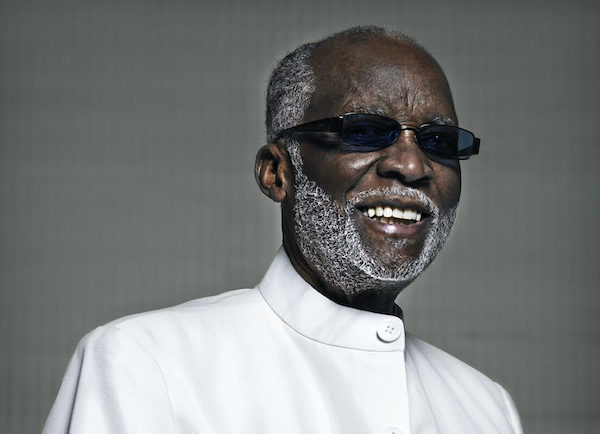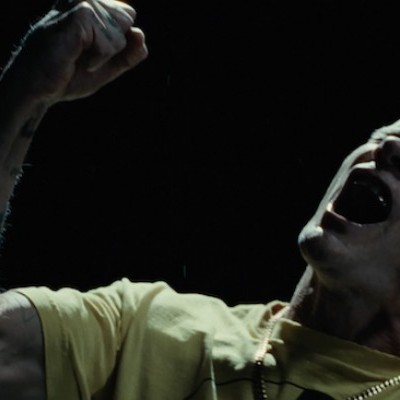Dec 9, 2025 12:28 PM
In Memoriam: Gordon Goodwin, 1954–2025
Gordon Goodwin, an award-winning saxophonist, pianist, bandleader, composer and arranger, died Dec. 8 in Los Angeles.…

Ahmad Jamal will release a new album, Marseille, on July 7.
(Photo: J-M. Lubrano)The rest of the tracks on Marseille are all instrumental, starting with the title track, performed in a bossa-nova, bolero-friendly tempo. You also included a new Afro-Cuban rendition of “Pots En Verre,” which was originally recorded on Ahmad Jamal With The Assai Quartet in 1998.
“Pots En Verre” means “glass jars” in French. In fact, I may write some lyrics to it and send it to Mina. It’s one of my favorite tracks. And the [rhythmic] structure here is in 6/8.
You also perform the standard “Autumn Leaves,” which has been in your repertoire for decades.
It’s a very interesting composition, and it’s the only non-original track on the disc. It’s been around for years. Miles recorded it. I recorded it. Israel came up with a beautiful bass line in one of my early recordings. It has great feel, and James is great on it, along with Manolo and Herlin. It works very well.
Your ballad “I Came to See You/You Were Not There” rings with the French impressionism of Ravel, with some Erroll Garner phrasing. Your pianism is more of a continuum of influences than a style.
That’s interesting. There are some Ravel-ish tones in the “Pots En Verre” as well. See, my hometown Pittsburgh has few parallels in producing people like George Benson, Art Blakey, Kenny Clarke, Ray Brown, Billy Eckstine, Roy Eldridge, Stanley Turrentine and Gene Kelly. I sold papers to Billy Strayhorn’s family. And Errol Garner and I attended Larimer elementary and Westinghouse High School. We didn’t have the separation between European and American classical music. … But when we grew up in Pittsburgh, we had to study both forms. When you hear a player from Pittsburgh, you may hear Duke Ellington, Count Basie, Debussy and Ravel.
You’ve recorded mostly for French labels for over two decades, and you were inducted that country’s prestigious Order of the Arts and Letters in 2007. What makes France special to you?
What made France special to Johnny Griffin, Kenny Clarke, Bud Powell and Sidney Bechet? All of those aforementioned notables moved to France because [the French] appreciate this music more than we do. Do you see Duke Ellington or Art Tatum every day on TV [in the U.S.]? You have to go to France to do that.
Thankfully, you are also getting recognized in the United States. You became an NEA Jazz Master in 1994. And on July 11, you will be presented with a Lifetime Grammy Award at the Beacon Theatre in New York. But how have you been able to perform at such an optimum level for all of these years?
There’s only one way: I try to have constant communications with the Creator every day. I pray five times a day or more. That’s how I managed to survive (laughs). There’s another Pittsburgher, Andy Warhol, who said that everybody has 15 minutes of fame. And that’s how I achieved mine. DB

Goodwin was one of the most acclaimed, successful and influential jazz musicians of his generation.
Dec 9, 2025 12:28 PM
Gordon Goodwin, an award-winning saxophonist, pianist, bandleader, composer and arranger, died Dec. 8 in Los Angeles.…

Belá Fleck during an interview with Fredrika Whitfield on CNN.
Jan 13, 2026 2:09 PM
The fallout from the renaming of the John F. Kennedy Center for the Performing Arts to include President Donald…

Flea has returned to his first instrument — the trumpet — and assembled a dream band of jazz musicians to record a new album.
Dec 2, 2025 2:01 AM
After a nearly five-decade career as one of his generation’s defining rock bassists, Flea has returned to his first…

The success of Oregon’s first album, 1971’s Music Of Another Present Era, allowed Towner to establish a solo career.
Jan 19, 2026 5:02 PM
Ralph Towner, a guitarist and composer who blended multiple genres, including jazz — and throughout them all remained…

Dec 11, 2025 11:00 AM
DownBeat presents a complete list of the 4-, 4½- and 5-star albums from 2025 in one convenient package. It’s a great…